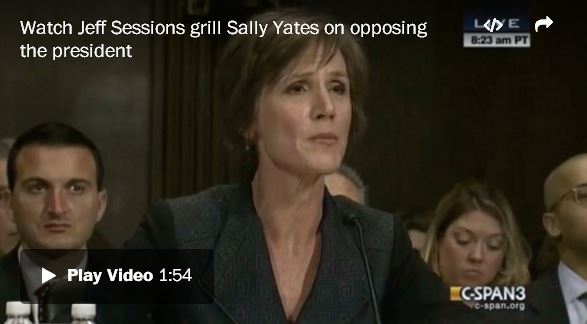After acting attorney general Sally Yates issued a memo on Jan. 30, for Justice Department lawyers not to defend President Trump's immigration order, he "relieved Ms. Yates of her duties," according to a White House statement. Dana Boente, the U.S. attorney for the Eastern District of Va., was sworn in to replace her. (Video: Jenny Starrs/Photo: Jabin Botsford, The Post; Kevin Lamarque, Reuters/The Washington Post)
Sally Yates had to know that when she refused to enforce President Trump's travel ban on Monday, she was effectively resigning her post as acting attorney general. After all, she was already a short-timer, a holdover from the Obama administration in place solely to bridge the time until Trump's attorney general nominee — Jeff Sessions — is confirmed later this week.
All the hubbub then about Trump's decision to dismiss Yates on Monday night kind of misses the point. It's not that Yates was dismissed that's important and telling. It's how she was dismissed that matters.
First of all, Yates was informed of her dismissal two minutes before the statement announcing it was sent to reporters. That's not exactly a long lead time, although, as I note above, she had to expect the firing since the second she ordered Justice Department lawyers not to enforce the travel ban.
The real key here is the White House's statement. And what a statement it was.
Here it is:
Where to start?
How about “betrayed” as the word choice for Yates's refusal to enforce the travel ban? There's no question that Trump was well within his rights to jettison Yates. But, to describe what she did as a “betrayal,” considering that she spent nearly three decades serving in the Justice Department, feels like unnecessarily incendiary language.
But the Trump White House was just getting started. The statement goes on to note that Yates is “weak on borders” and “very weak on illegal immigration.” There's no evidence cited for that slam on Yates. But presumably the White House is referring to the role she played in the executive order that then-President Barack Obama signed that exempted the undocumented parents of children born in the United States (DAPA) and children brought into the United States illegally before their 16th birthday (DACA) from deportation. On the Senate floor, Sessions voiced those concerns before Yates's confirmation vote as deputy attorney general in 2015.
“Sooner or later, we're going to have to confront the stark question of how long can we remain effectively silent in the face of presidential overreach,” Sessions said at the time. “We're going to regret the day if we remain silent on this issue." (Yates was confirmed 84 to 12.)

During Sally Yates's 2015 confirmation hearing for deputy attorney general, Sen. Jeff Sessions (R-Ala.) questioned whether Yates was prepared to "say no" to the president if necessary. Yates was fired by President Trump Jan. 30, after refusing to enforce his controversial travel ban executive order. (Monica Akhtar, Deirdra O'Regan/The Washington Post)
There's no problem with Trump White House officials disagreeing with the past administration's stance on immigration. That is, of course, their right. But, again, the scorched-earth condemnation of Yates strikes me as rhetorically overboard and, dare I say it, not terribly presidential.
One final thing: After blasting Yates repeatedly, the statement makes the somewhat baffling assertion that “calling for tougher vetting for individuals traveling from seven dangerous places is not extreme. It is reasonable and necessary to protect our country.” That seems to run directly counter to Trump's repeated stance that he would institute a policy of “extreme vetting” for a certain bloc of predominantly Muslim countries. The person who injected the word “extreme” into the conversation about travel bans is Trump. So it's more than a little odd that his White House is now going out of its way to say that the vetting proposed in the travel ban isn't extreme.
What Trump's statement, viewed broadly, teaches us — or, maybe, reteaches us — is that this president sees only two kinds of people in the world: loyal friends and disloyal, terrible enemies. Principled — or occasional — opposition is not part of that equation. You are either all the way for him or all the way against him. Black and white. No room for gray.
For those whom he perceives as being against him, Trump is entirely unafraid to go after them personally. The moment you cross from supportive of his interests to, well, not, is the moment you die to him. He will not just burn bridges with those he believes have betrayed him. He will napalm those bridges.
The Yates firing is yet another example of how Trump is fundamentally different from the many people who have preceded him as president. Niceties mean nothing. The world is a tough place. If you don't hit, you are going to be the one getting hit. And Trump will always make sure he throws some punches.
(The Washington Post)